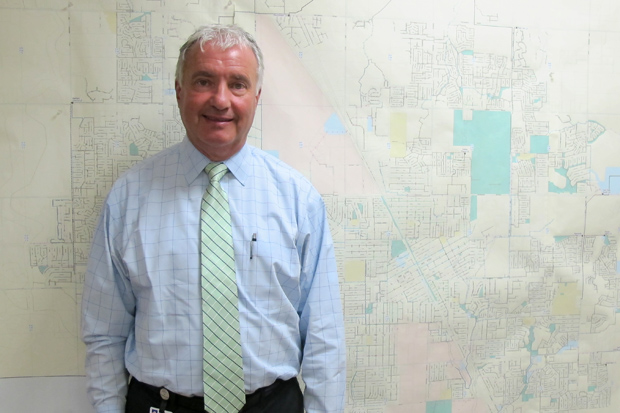Why Midwest City Might Fight Norman’s Plan to Recycle Treated Wastewater
-
Logan Layden

Logan Layden / StateImpact Oklahoma
Norman Utilities Director Ken Komiske
With concern over drought at a high point and plans to get water from southeast Oklahoma falling through, the City of Norman decided in 2014 to pursue a plan to clean water that has been used by customers and return it to Lake Thunderbird — the city’s main water source — to be used again.
There’s a growing trend toward wastewater reuse to combat drought and conserve water sources for the future, but not everyone is comfortable with the idea of drinking what is, in essence, retreated toilet water. And Norman isn’t the only city that relies on Lake Thunderbird for its drinking water.
The Journal Record‘s Sarah Terry-Cobo talked to Midwest City Environmental Services Director Bill Janacek, who says Norman can’t completely clean the wastewater it wants to put back into the lake:
“Nobody can tell us what, if any, problems will evolve (from those chemicals),” Janacek said.
He said he is concerned about chemicals, including hormone-altering agents from fertilizers and pharmaceuticals, that wastewater treatment plants can’t completely remove. If Norman puts treated wastewater into Lake Thunderbird, Midwest City’s drinking water treatment plant couldn’t get rid of all those compounds.
Terry-Cobo reports the Midwest City council will meet Tuesday night to hear the results of an engineering study related to Norman’s reuse plan, and then could hold a vote to oppose it. But Terry-Cobo also talked to Randy Worden with the Central Oklahoma Master Conservancy District and Norman Utilities Director Ken Komiske, who understand Midwest City’s concerns but don’t think there’s any reason to worry:
The Central Oklahoma Master Conservancy District manages Lake Thunderbird, which Norman, Midwest City and Del City rely upon as a raw water supply for drinking water. Conservancy General Manager Randy Worden said Janacek’s concerns aren’t backed by science that shows adverse effects on people. Chemicals are already in Lake Thunderbird, in part as the result of runoff from fertilizers, he said.
Komiske said he understands it’s not sufficient to tell residents not to worry.
“We do need to look at chemicals of emerging concern,” Komiske said. “We would never be able to talk to our voters with a clear conscience if we didn’t.”
It will eventually be up to the seven-member board that advises the conservancy district whether Norman can move forward with its plan, the paper reports.
Oklahoma Water Resources Board Executive Director J.D. Strong weighed in on the water reuse issue in a StateImpact story from last spring, when he told an audience at a public meeting in Yukon to “get over” the ick-factor associated with drinking treated wastewater, because many already are.
“One of the things I tell people when we’re having discussions in the Oklahoma City metro area, and people want to talk about, ‘That’s gross,’ or ‘I’m not drinking somebody’s wastewater,’ usually I tell them, ‘You are drinking somebody’s wastewater,” Strong told the audience. “You’re drinking El Reno’s wastewater right now, because they discharge their wastewater into the North Canadian and it runs right down here into Overholser.
